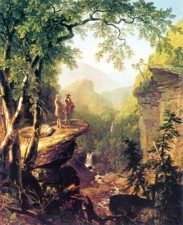Another Green World
September 22 – November 28, 2010
Opening: Wednesday, September 22, 6-9pm
Betty Beaumont
Jennifer Bolande
Vija Celmins
Neil Jenney
Barbara Ess
Nancy Holt and Robert Smithson
Mathias Kessler
Gerhard Richter
carriage trade
62 Walker Street
New York, NY 10013
The exhibition Another Green World intends to draw parallels between the genre of landscape and the current preoccupation with “green” in popular culture. While the romanticism of 19th century landscape tradition linked the sublimity of nature with the existence of God, it also lent inspiration for westward expansion and the underlying impulse of “man’s” dominion over nature. This mixture of the profound with the pragmatic speaks to a fundamental contradiction in society’s relationship to nature, as the unchecked use of natural resources clashes with the idyllic image of nature as a world “set apart” and untouched by daily life. The commercial appropriation of green imagery is the most recent manifestation of this contradiction, as “greenwashing” facilitates the smoothing over of a conflict that most likely originates in the landscape tradition itself, where the goal of depicting the sublime beauty of the land was at times directly connected to its ultimate exploitation and control.
The heightened realism and precisely articulated imagery of the Hudson River School painters Albert Bierstadt and Frederick Church was motivated by their belief in the existence of a “perfect being” responsible for the mountains, rivers, and falls that were their subjects. Overwhelming the spectator with oversized paintings that implicitly claimed possession of the “view” on their behalf, their spectacular naturalism inspired a combination of fear and awe for the wonders of nature, attracting crowds wowed by their technical virtuosity. The dramatically idealized views of nature produced by some artists and photographers of the period for government surveys and the railroads provided inspiration for the nationalist agenda of Manifest Destiny, with little visual evidence of its attendant brutality. Encouraging reverence toward a natural world eventually “put to use” for material gain, the legacy of American landscape painting is accompanied by some ambivalence, with parallels to today’s “greening” of consumerism, where nature is invoked as a means of “cleansing” industrial products of their environmentally questionable origins. Although the romantic character of the landscape tradition would eventually be channeled into modernist abstraction, the benevolence associated with naturalism has remained, often serving as a means of neutralizing conflicts of landscape and place. “Green” is now identified with anything from new technologies to luxury condos and deodorant, its indiscriminate use serving as a fairly clear a sign of its ideological import. As our conflicted interaction with nature reveals itself through “breakdowns” in weather patterns and resource-associated disasters that temporarily grab headlines in the daily news, the view of the natural world as simultaneously “good,” wondrous, and exploitable belies a growing awareness of potentially ominous environmental scenarios. Presenting artwork that engages the landscape tradition to varying degrees, the exhibition Another Green World represents an effort to explore these contradictory impulses and their underlying conflicts, which are now frequently veiled under a thin veneer of green. carriage trade 212.343.2944 Peter Scott / Director pscott@carriagetrade.org |
